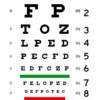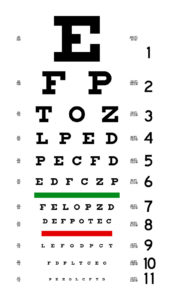
Key Differences Between Vision Screening and Eye Exams
We’re willing to bet that the moment you saw the term “vision screening” in the title, you probably thought of a Snellen Chart (one of those boards with increasingly tiny letters). And when you saw the term “eye exam” you well, probably thought of a Snellen Chart again. Should you even worry about the difference between these two vision check-ups?
We can’t really blame you. The two terms sound awfully similar. Let’s be honest, vision exams aren’t what you’d call highly memorable events (except for, of course, Snellen Charts). However, there are a few key differences between the two, and it’s important to understand them – both for your own sake, and for your family’s. Follow along, and we’ll break them both down, and hopefully leave you feeling a little more prepared to care for your eyes.
Vision Screening
 Even if you forget everything else we talk about for the rest of this article, remember this: vision screening is exactly what it sounds like – screening. A vision screen can take on an extremely wide variety of forms. If the nurse at your child’s school brings along a (last time we’ll mention them) Snellen Chart and puts a class through its paces, that’s a vision screening. If, during a routine physical, your doctor performs a similar, cursory vision exam, that’s a vision screening. Responding to flashing lights before renewing your license that is, once again, a vision screening.
Even if you forget everything else we talk about for the rest of this article, remember this: vision screening is exactly what it sounds like – screening. A vision screen can take on an extremely wide variety of forms. If the nurse at your child’s school brings along a (last time we’ll mention them) Snellen Chart and puts a class through its paces, that’s a vision screening. If, during a routine physical, your doctor performs a similar, cursory vision exam, that’s a vision screening. Responding to flashing lights before renewing your license that is, once again, a vision screening.
You get the point.
Screenings aren’t meant to be in depth or exhaustive. Instead, they’re designed to be quick, allowing screeners to pick up on any issues that obviously require further investigation. Additionally, they’re broad spectrum. While a more intensive exam might take things such as your or your family’s medical history into account, screenings skip that step in favor of what we might call a shotgun approach. Finally, it should be noted that screenings are often conducted by volunteers, nurses, or students instead of doctors. While the volunteers, nurses, and students are likely sharp, caring individuals, they won’t carry the same depth of experience as a qualified physician.
Parents should take especially careful note of the above cautions. A clean bill of health for your child following a vision screening might sound reassuring. However, it’s important to realize that these tests are far from the final word on well-being.
Eye Exams
An eye exam is, as you might guess, the more thorough cousin to a screening. Eye exams are conducted by eye doctors, and take factors such as medical history into consideration. Beyond detail, the main difference between a vision screening and an exam is the outcomes they can produce. A screening that raises red flags will simply send you on to a comprehensive exam. However, by the end of an exam, an ophthalmologist can create a personalized plan of treatment and set it in motion. This can range from prescribing medication or lenses to beginning the first legs of elective surgery.
Unlike a screening, doctors will actively examine for multiple disorders. These include crossed or misturned eyes (strabismus), differences in acuity between the eyes (amblyopia), and a raft of other vision-related issues that a quicker checkup might not catch.
Even more importantly, a trained ophthalmologist is much, much more likely to notice early signs of eye disease. Even extremely serious conditions, such as glaucoma, can have few noticeable signs during early stages of development. Most vision screenings are designed to perform an extremely wide sweep of potential problems, and may miss these apparently minor details.
And your eyes aren’t the only things that could benefit from an exam. A long list of other diseases often show their earliest symptoms in a sufferer’s eyes – and we don’t mean that poetically. Let’s take Ankylosing Spondylitis, one flavor of inflammatory arthritis. Many people with AS often feel it first as non-specific back pain. This is a notoriously hard thing to pin on any one symptom. However, AS can also cause telltale irritation to the eyes. A doctor will detect this issue more easily in an eye exam than a routine physical.
What This Means for You
The biggest point you should take away from the above sections is this: vision screenings are not a sufficient safeguard of eye health. They’re helpful, definitely, but they simply aren’t designed to catch all possible problems. When you’re talking about your vision, that’s not quite enough. Instead, it’s best to find an eye doctor you trust. Schedule consistent eye exams, with frequency contingent on their recommendations. This goes double for children. Vision screenings can easily miss a large percentage of the many, many things that can go wrong with a child’s eyes. So don’t be content with a school’s screenings; make sure your child sees a doctor early and often.
Prepare for Your Eye Exam or Vision Screening
When you do go in for your eye exam, keep in mind the difference between optometrists and ophthalmologists. Optometrists can usually determine whether you need prescription lenses and help you select some. However, if you’re worried about deeper vision issues, make sure you see an ophthalmologist. They will be better able to assist you in determining long term care options.
Additionally, make sure you arrive to your eye exam prepared to get the most out of it. Think of some questions to ask your eye doctor, and perhaps bring a friend or family member along in case they dilate your eyes and you can’t drive safely afterward. It’s also always nice to get a second opinion if you need to pick out some new frames.
Apart from that, do everything you can to keep your eyes healthy on a day-to-day basis. Screenings and exams aside, find ways to help yourself out. The Rebuild Your Vision Ocu-Plus Formula, which includes 17 essential vitamins, minerals and herbs, ensures that your eyes are getting all the nutrients they need to stay in top form. Eye exercises are another great way to keep your eyes in tip-top shape. By incorporating daily eye vitamins and exercises into your routine, you should get through your next screening – or exam – with flying colors.
Our Rebuild Your Vision Ocu-Plus Formula Contains All 17 Vitamins, Minerals, and Herbal Supplements to Improve Your Eye Health!












Hi Tyler, I believe you have a comprehensive vitamin supplement which is not offered by any pharmaceutical company. I have followed the consumer feedback with interest and noted that the stories published are limited to correcting vision. There is evidence to suggest that the onset of age related eye disorders such as cataract and AMD are manifesting at an earlier age with better diagnosis.
I am yet to see any reviews posted about the experiences of people living through these eye disorders who continue to use your product and experience small improvements. It is important to provide a balanced view in my opinion by giving equal importance to those who provide feedback.
Best regards,
Olivier